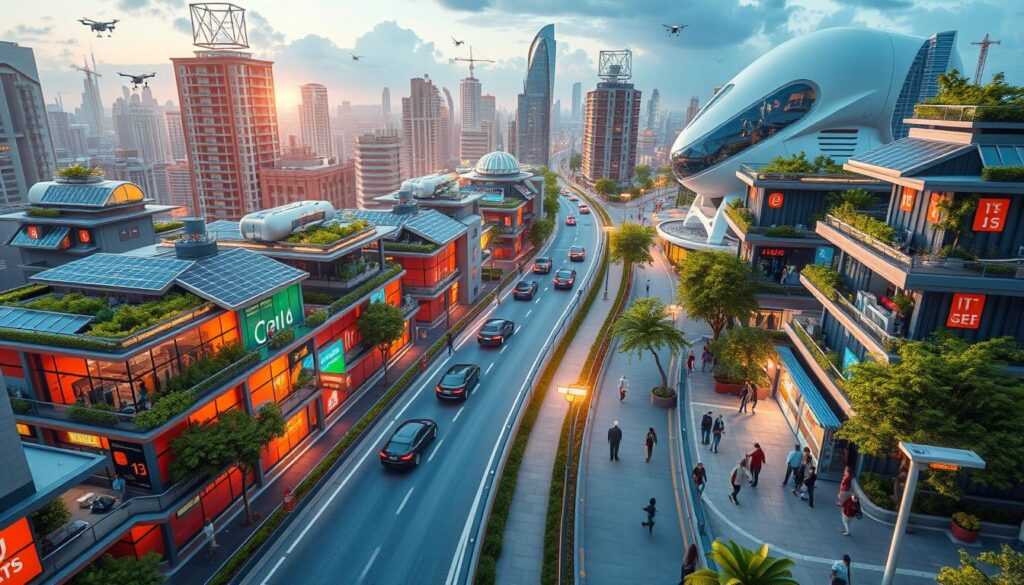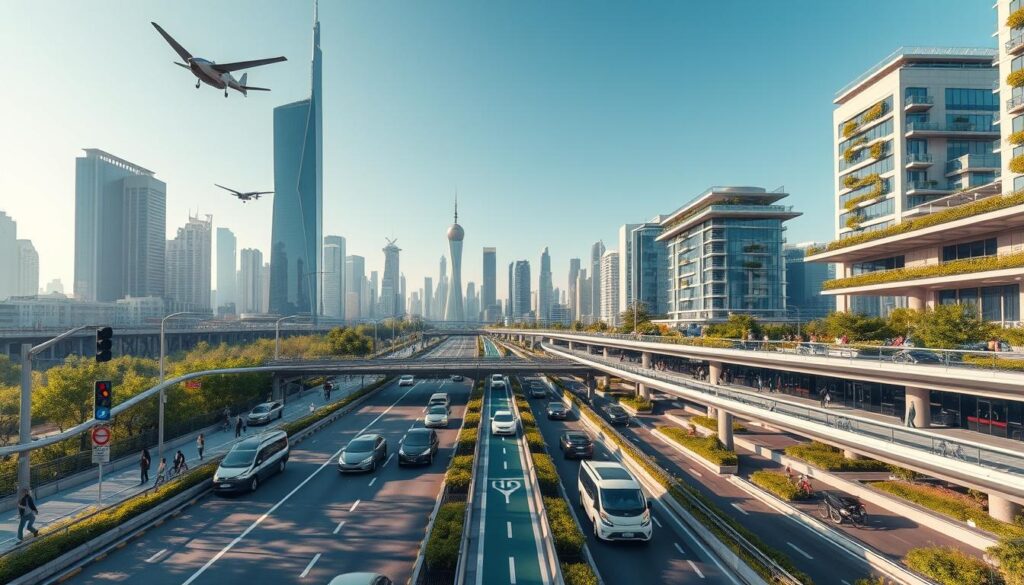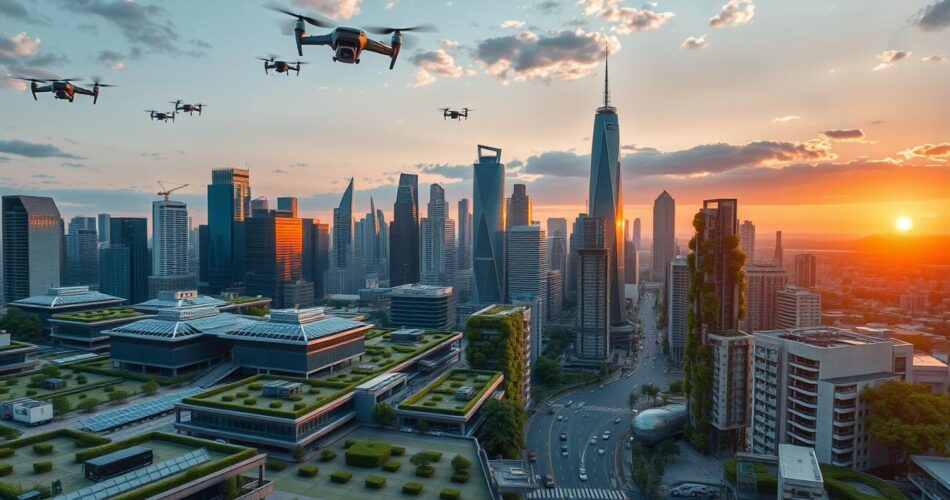As you walk through a modern city, you might wonder at the tech changes. These changes are making cities smarter and better places to live. They include things like smart traffic systems and green energy plans.
In this article, we’ll look at the top smart cities projects changing our world. If you’re into city planning, tech, or just care about cities, this list will amaze you. It shows the exciting future of our cities.
Get ready to be amazed by these city-changing projects. They’re making cities smarter, greener, and better for everyone. From new ways to move around to big steps towards sustainability, these smart city projects are making a big difference.
What is a smart city?
The idea of a smart city is becoming popular around the world. It aims to make cities better to live in, more sustainable, and efficient. A smart city uses new technologies and data to solve city problems and improve life for its people.
Understanding the Concept of a Smart City
A smart city uses digital technologies and data-driven strategies to improve city life. It works to make cities better places to live, more sustainable, and economically strong. This approach helps create a better urban environment for everyone.
Key Components of a Successful Smart City Initiative
For a smart city to succeed, it needs a few important things:
- Robust digital infrastructure, like fast internet, sensors, and connections for data sharing
- Data-driven decision-making, using real-time data to make better choices and improve services
- Citizen-centric services, focusing on making life better for residents and improving city services
- Sustainable energy and environmental management, using green energy, efficient buildings, and smart waste systems
- Intelligent transportation systems, making traffic, public transit, and other travel options better
- Enhanced public safety and security, using tech to prevent crime, respond to emergencies, and manage disasters
By combining these elements, smart cities aim to make urban areas better places to live, work, and play.

smart cities projects
Smart cities projects revolutionizing transportation
Smart cities projects are changing how we move around cities. They aim to make cities more efficient and green. These projects show us what the future of getting around might look like.
Intelligent traffic systems are a big part of this change. They use sensors and data to manage traffic better. This helps reduce traffic jams and makes travel smoother.
Autonomous vehicles are another big step forward. They could make traveling safer and easier for everyone. This includes those who can’t drive themselves.
Integrated mobility platforms are also important. They connect different ways to travel, like buses and bikes. This makes it easier for people to choose the best way to get where they need to go.
| Smart City Transportation Solution | Key Benefits |
|---|---|
| Intelligent Traffic Management Systems |
|
| Autonomous Vehicles |
|
| Integrated Mobility Platforms |
|
As smart cities projects keep innovating, the future of city travel looks bright. It will be more efficient, green, and open to everyone. These changes are making cities better places to live.

smart cities projects
Innovative smart cities projects for sustainable energy
Cities around the world are tackling environmental issues head-on. Smart cities lead the way with renewable energy projects. These efforts change how cities power their buildings and infrastructure, aiming for a greener tomorrow.
Renewable Energy Initiatives in Smart Cities
Smart cities use solar, wind, and geothermal energy to cut down on carbon emissions. For example, project smart city in San Diego, California, has set up solar panels on public buildings. These panels power streetlights, city facilities, and electric car charging stations.
Energy-Efficient Buildings and Infrastructure
Smart cities also focus on making buildings and infrastructure more energy-efficient. In Boston, Massachusetts, the city has upgraded buildings with better insulation and energy-saving windows. This has led to big cuts in energy use and pollution.
| Renewable Energy Initiatives | Energy-Efficient Buildings |
|---|---|
|
|
Through these smart cities projects, cities are making a big difference. They’re not just reducing their environmental impact. They’re also building a more sustainable and strong future.
Smart cities projects enhancing public safety
As cities get more crowded, keeping everyone safe is a top goal for smart cities around the world. City leaders are using new tech to fight crime, respond to emergencies, and keep communities secure.
Leveraging Technology for Crime Prevention
Smart cities are using top-notch surveillance systems to boost safety. They have high-def cameras, license plate readers, and facial recognition to spot and track suspects fast. They also use predictive analytics to find crime patterns and hotspots, helping police focus their efforts.
Another key tech effort is real-time emergency response systems. These systems use sensors and networks to spot emergencies right away. They alert first responders quickly, giving them the info they need to act fast. This cuts down on response times and makes cities safer.
| Smart City Initiative | Key Benefits |
|---|---|
| Surveillance Systems | Improved crime detection and suspect identification |
| Predictive Analytics | Enhanced crime prevention through targeted resource deployment |
| Real-Time Incident Response | Faster emergency response times and more effective crisis management |
By adopting smart cities projects with the latest tech, city leaders are making their places safer. As these project smart city efforts grow, we’ll see even more creative ways to tackle today’s public safety issues.
Smart cities projects driving economic growth
Smart cities projects are changing the game for economic growth. They’re not just making cities better but also attracting businesses and creating jobs. As they grow, they’re becoming key players in the economy.
These projects use new tech to make things run smoother and cheaper. For example, smart traffic systems help move people faster, making businesses more productive. Smart energy and green buildings also cut costs, drawing in investors and companies.
Smart cities are also hotspots for talent and new ideas. They support startups and tech firms, leading to the creation of new jobs and diverse economies.
| Smart City Project | Economic Impact |
|---|---|
| Smart Mobility Initiative in Singapore | Reduced congestion, increased productivity, and attracted tech companies to establish regional headquarters |
| Smart Grid Deployment in Toronto, Canada | Improved energy efficiency, reduced costs, and attracted investments in renewable energy startups |
| Digital Innovation Hub in Barcelona, Spain | Fostered the growth of a thriving tech ecosystem, created thousands of high-skilled jobs, and positioned Barcelona as a leading smart city |
As more cities go smart, these projects will be crucial for growth. They’re using tech and infrastructure to open up new business and job opportunities. This is changing how we see the future of cities.
Smart cities projects improving healthcare
In today’s digital world, smart cities are changing healthcare. They are focusing on telemedicine and remote patient monitoring.
Telemedicine and Remote Patient Monitoring
Telemedicine and remote monitoring let doctors care for patients at home. These smart cities projects make healthcare better, improve patient results, and use resources wisely.
- Telemedicine lets patients talk to doctors online, cutting down on visits and easing hospital stress.
- Remote monitoring devices track patients’ health, helping doctors act fast and manage diseases better.
- Smart cities projects add these techs to healthcare, so everyone gets top-notch care, no matter where they are.
Technology is changing healthcare in smart cities. It makes care more accessible, efficient, and tailored to the community’s needs.
Smart cities projects fostering inclusivity
Smart cities are more than just tech advancements. They aim to create welcoming spaces for everyone, including those with disabilities. Around the world, smart city projects are using new tech to make cities more accessible and inclusive.
Accessible Technologies for People with Disabilities
Smart city projects focus on creating assistive technologies for people with disabilities. These efforts are changing how people with different needs interact with their surroundings. They’re making it easier for everyone to access important services.
From voice-controlled smart home systems to tactile navigation aids, smart cities are making a big difference. They’re also improving transportation and public spaces to be more accessible.
- Inclusive transportation: Smart city projects are adding features like audible traffic signals and wheelchair-accessible transit. This ensures everyone can move around easily.
- Adaptive communication tools: New communication platforms, like text-to-speech and speech-to-text, are being introduced. They help people with hearing or speech issues communicate better.
- Intelligent building automation: Buildings are being designed with voice-activated controls and motion-sensing lights. These features improve the independence and safety of residents with disabilities.
By focusing on inclusivity, smart cities are empowering people with disabilities. They’re also making cities better for everyone.
Smart cities projects transforming education
In today’s digital age, smart cities projects are changing education. They use new technologies to make learning better, more personal, and ready for the future.
One cool project is using virtual and augmented reality (VR/AR) in schools. It lets students dive into history, science, and culture from their desks. This makes learning fun and deep.
Adaptive learning platforms are also key. They use AI to adjust learning to each student’s needs. This way, everyone gets the help they need to do well.
Cloud-based tools help students and teachers work together easily. This teamwork builds important skills like problem-solving and communication.
By taking on these smart cities projects, schools are making learning better. They’re also getting students ready for a world where tech skills are crucial.
| Smart Cities Project | Impact on Education |
|---|---|
| Virtual and Augmented Reality | Immersive learning experiences, enhanced understanding of complex concepts |
| Adaptive Learning Platforms | Personalized education, tailored to individual student needs |
| Cloud-based Collaboration Tools | Seamless communication, teamwork, and knowledge-sharing |
As project smart city grows, education will get even better. It will be more fun, personal, and tech-savvy. This will help students succeed in tomorrow’s world.
Smart cities projects optimizing waste management
As cities grow, finding better ways to manage waste is key. Smart cities worldwide are leading the way with new recycling and waste reduction methods. These efforts not only help the environment but also make life better for city folks.
Innovative Recycling and Waste Reduction Solutions
Smart cities use the latest tech to make waste management better. IoT-enabled smart waste bins keep track of how full they are and help plan when to collect them. This cuts down on waste and saves fuel. Automated sorting systems use computers and learning to sort recyclables faster and more accurately.
- Predictive analytics to optimize waste collection routes and schedules
- Sensor-equipped waste bins that communicate fill levels in real-time
- Advanced sorting technologies to improve recycling stream purity
- Waste-to-energy facilities that convert non-recyclable materials into electricity or fuel
These smart cities projects are cutting down on landfill waste. They also open up new chances for using resources again. By using data and tech, smart cities are moving towards a greener, more efficient future.
The role of smart cities projects in mitigating climate change
Smart cities projects are key in fighting climate change. They use new technologies and green practices. This helps cut down on harmful emissions and makes cities more resilient.
These cities focus on renewable energy and green buildings. They use the sun and wind to power homes and offices. This makes cities more eco-friendly and sets a good example for the future.
Smart cities also use data and smart traffic systems. They help move people and goods more efficiently. This reduces traffic jams and encourages people to use cleaner ways to travel.
